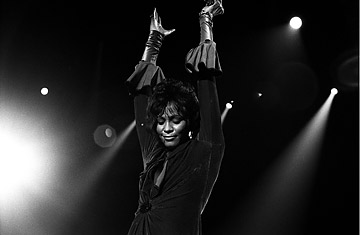
Whitney Houston
In the middle of a 1990 interview with Essence magazine, Whitney Houston suddenly unleashed one of those gospel-inspired flurries of notes that she could sing better than anyone else. Then she stopped. "That's nice," the pop superstar said of her vocal acrobatics. "I love that mess. But does it make a record, and does it have worldwide appeal? And what happens after that? Longevity--that's what it's all about. If you're gonna have a long career, there's a certain way to do it, and I did it that way. I'm not ashamed of it."
Houston, who died Feb. 11 at 48 of as yet undetermined causes, was a populist above all. The music she chose to sing was a careful but thrilling blend of gospel, soul and pop that made her a staple of dance clubs and light-rock stations and helped her become America's fourth-best-selling female artist of all time, after Barbra, Madonna and Mariah. She wasn't an instrumentalist, she wasn't particularly a dancer, and she was about as much an actor as Elvis Presley was. What sold an estimated 170 million albums, singles and videos worldwide and won her six Grammys was her voice--an extraordinary one, blessed with magnificent tone, power and precision, that could soar three octaves and leave you hanging on the quietest of trills. And she used it to reach the broadest audience she could, planning for the long term in an industry that often consigns its stars to the oldies circuit after a few years or throws them away altogether.
Houston grew up around women who could show her how to sustain a life in singing: gospel great Cissy Houston was her mother, Dionne Warwick her cousin, Aretha Franklin her godmother. Arista Records' Clive Davis spent a year and a half picking the songs for her debut album, 1985's Whitney Houston, which yielded four enormous hits. Three of them were slow, emotive torch songs that became radio evergreens, and the fourth was the breathtaking, up-tempo "How Will I Know," which topped both the pop and R&B charts. Most 21-year-old singers are still developing as artists; Houston had arrived fully formed.
From then until 1992, when the sound track to Houston's film The Bodyguard featured her full-throttle cover of Dolly Parton's "I Will Always Love You"--which stayed at No. 1 for 14 weeks--the only other pop singer of her technical caliber was Michael Jackson. And whereas his persona was, as he put it, "not like other guys," Houston presented herself as being exactly like other girls--a likable, fresh-faced everywoman.
The Bodyguard was a victory after which she could afford to coast. She would never come near its 17-times-platinum success again, but a lesser hit by her standards was still a smash by anyone else's, and in 2001 she signed a $100 million contract with Arista. The broad appeal she had cultivated early on lingered and helped insulate her career, even as her marriage to Bobby Brown became a sadistic reality show and drug addiction sapped her professional drive. She had permanent cachet with club DJs, who continued to turn remixes of her new singles into dance hits, and after 9/11, her virtuosic 1991 Super Bowl performance of "The Star-Spangled Banner" became a Top 10 hit.
